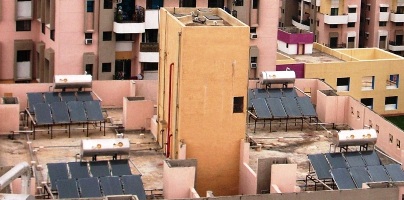India: Rajasthan Subsidises Electricity Bill of Solar Water Heater Users
February 1, 2012
Solar Water Heaters in India
 The Indian state of Rajasthan has strongly supported the market for solar thermal technology. Since 2004, the state in the northwest of India has had a comprehensive mandatory law for solar water heaters: Solar energy use has been an essential requirement in setting up new hospitals, sports complexes, swimming pools, hostels, barracks, hotels, industrial buildings in which hot water is needed to process the goods, as well as public buildings and residential buildings with a plot size of 500 m2 and above. In 2011, the state government has also granted an indirect subsidy to residential users of Solar Water Heaters (SWH). Having come into force three months ago, the scheme allows every SWH user to receive a rebate on its electricity bill of INR 0.25 INR/kWh of electricity, capped at a maximum of INR 300 per month – independent of the age of the system.
The Indian state of Rajasthan has strongly supported the market for solar thermal technology. Since 2004, the state in the northwest of India has had a comprehensive mandatory law for solar water heaters: Solar energy use has been an essential requirement in setting up new hospitals, sports complexes, swimming pools, hostels, barracks, hotels, industrial buildings in which hot water is needed to process the goods, as well as public buildings and residential buildings with a plot size of 500 m2 and above. In 2011, the state government has also granted an indirect subsidy to residential users of Solar Water Heaters (SWH). Having come into force three months ago, the scheme allows every SWH user to receive a rebate on its electricity bill of INR 0.25 INR/kWh of electricity, capped at a maximum of INR 300 per month – independent of the age of the system.
Photo courtesy: Jaideep Malaviya
For example, this means that an SWH user who consumes 325 kWh of grid-supplied electricity per month receives a reduction on its electricity bill of INR 81.25 (325 kWh x 0.25 kWh/INR). The rebate is granted over a period of 5 years. The new regulation is part of the “Tariff for Supply of Electricity – 2011” (No. 5 page 8) by Jaipur Power Distribution Company which was published on 7 October 2011. Prior to this date, the electricity company from the capital of Rajasthan paid an incentive of 0.05 INR/kWh of consumed electricity to users of solar water heaters.
The new solar thermal incentive was an idea by the state government and could first be found in the Rajasthan Solar Energy Policy 2011 statement published in April 2011. In September, the Rajasthan Electricity Regulatory Commission included the new regulation in its updated tariff order.
According to the Rajasthan Renewable Energy Corporation Ltd (RRECL) – the nodal agency promoting renewable energy – the subsidy has been extended to the other two power distribution companies of the state: Ajmer Power Distribution Corporation and Jodhpur Power Distribution Corporation. The rebate is now available throughout the entire state and the incentive is automatically included in the monthly electricity bills created by the respective distribution companies. The state government later compensates the utilities for granting the reduction.
To apply for the rebate, consumers must fill in a form that can be downloaded on the website of the Rajasthan Electricity Regulatory Commission. This form has to be submitted to the executive engineer’s office at the respective electricity supplier, and it has to list all available details, such as the code number of the electric metre, date of purchase of the SWH, name of the SWH manufacturer, the type of SWH and its tank capacity.
Rajasthan’s electricity bill rebate is paid in addition to the investment subsidy from the federal financial scheme. RRECL says that the state has already received applications totalling 2,000 m2 of collector area since the electricity tariff rebate was announced in October and the industry is in optimistic mood. The state of Rajasthan enjoys one of the highest irradiations in India.
More information:
http://www.rrecl.com/
http://www.jaipurdiscom.in/


